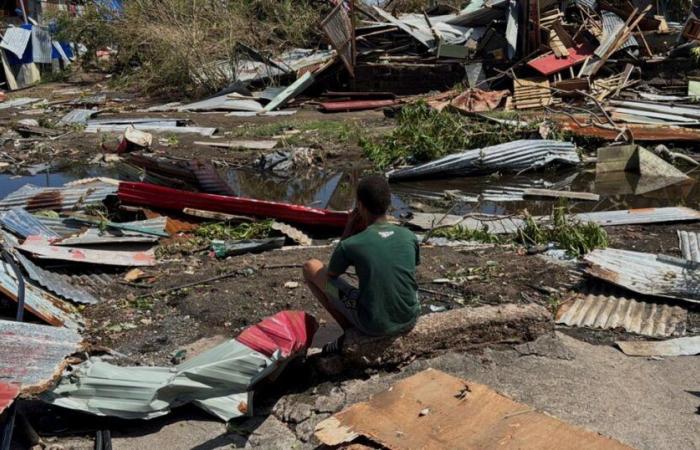“The scale of the disaster cannot yet be quantified, but it is feared that it will reach figures never seen in the history of modern France”écrit The Vanguard.
The day after the passage of Cyclone Chido, which ravaged the archipelago and razed entire areas of the territory with winds of more than 225 km/h, the prefect of Mayotte François-Xavier Bieuville was pessimistic about the human toll.
“I think there will certainly be several hundred, maybe we will approach a thousand, or even a few thousand” of deaths in view of the “violence” of the cyclone, he declared on local television, while a provisional report on Sunday evening showed fourteen dead and 250 injured.
But as the Catalan daily underlines, we will not know “probably never the exact number of victims”who are “the vast majority of them are undocumented immigrants”, and whose Muslim religion requires burying the deceased within 24 hours of their discovery.
Shaved neighborhoods
“Aerial images provided by the French gendarmerie showed the ruins of hundreds of makeshift houses scattered on the hills of one of the islands of the archipelago”tell The Guardian. “In some areas, entire neighborhoods of shacks and metal shacks have been razed”.
In the 101st French department, the poorest in the country – where 77% of the population lives below the poverty line – “most of the approximately 300,000 residents live in tin-roofed shacks, and tens of thousands have lost their homes”underlines the BBC.
“The situation is chaotic”confirms The Country. “Communications have also been seriously affected, making it difficult to count victims among a traumatized and confined population, without access to water or electricity”.
“More than 15,000 homes are without electricity. And telephone services, even emergency services, are severely restricted”specifies the Madrid daily.
Euronews reports the testimony of Chad Youyou, a resident of Hamjago, north of the main island of Mayotte, who “posted videos on Facebook showing the extensive damage in his village and surrounding fields and hills, where almost all the trees were razed”.
“Mayotte is destroyed, we are destroyed”he declares.
Air and sea bridge
Some 1,600 police and gendarmes have been deployed “to help the population and prevent looting”note Newsweekwhile “rescuers and firefighters from mainland France and the neighboring French territory of Réunion provide additional support”.
“An air and sea bridge is being established from Reunion to facilitate the arrival of around 800 additional rescuers and more than 80 tonnes of emergency equipment”adds the American title. “Immediate priorities include restoring electricity and access to drinking water, critical needs in a territory already facing a water shortage before the storm”.
In fact, even before being struck by Chido, the Mahorese population was already living in very difficult conditions. For The Vanguardthe archipelago is one of the cases “the most extreme” of a “French colonial heritage” Sometimes “explosive”.
Mayotte suffers from a “endemic poverty” and immigration – mainly from neighboring Comoros – “out of control, untenable”judges the Catalan title. “There is a lot of delinquency, a lack of drinking water, and health services are always overwhelmed”.
Pope Francis deplores a “tragedy”
Newsweek considers that the disaster highlights “the particular vulnerability of the large undocumented population of Mayotte”. The American title observes that “more than 100,000 undocumented migrants live in the territory, many of them in precarious housing that was no match for Chido’s violent winds”.
The resigning Minister of the Interior Bruno Retailleau, as well as his colleagues from Overseas and La Francophonie, are expected on the archipelago late Monday morning. President Emmanuel Macron, for his part, promised “d’agir” for the Mahorais, during his meeting on Sunday in Corsica with Pope Francis. The latter said he supported “by the spirit” the victims of the “tragedy”.
After sweeping Mayotte, Chido made landfall on Sunday in Mozambique “in the province of Cabo Delgado, just south of the town of Pemba”where he killed three people, reports the New York Times. “As it moves inland, towards the southwest, it is expected to weaken significantly”.






